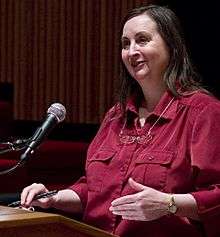Christine Korsgaard
Christine Marion Korsgaard, FBA (/ˈkɔːrzɡɑːrd/; born April 9, 1952) is an American philosopher and Arthur Kingsley Porter Professor of Philosophy at Harvard University whose main scholarly interests are in moral philosophy and its history; the relation of issues in moral philosophy to issues in metaphysics, the philosophy of mind, and the theory of personal identity; the theory of personal relationships; and in normativity in general.
Christine Marion Korsgaard | |
|---|---|
 | |
| Born | April 9, 1952 (age 68) Chicago, Illinois, United States |
| Alma mater | Harvard University University of Illinois |
| Era | 20th-century philosophy |
| Region | Western philosophy |
| School | Analytic |
| Institutions | Harvard University |
Main interests | Moral philosophy · Kantianism |
Influences
| |
Influenced
| |
Education and career
Korsgaard first attended Eastern Illinois University for two years and transferred to receive a B.A. from the University of Illinois and a Ph.D from Harvard, where she was a student of John Rawls. She received an LHD Doctor of Humane Letters from the University of Illinois in 2004.[1] She is a 1970 alumna of Homewood-Flossmoor High School in Flossmoor, Ill.

She has taught at Yale, the University of California at Santa Barbara, and the University of Chicago; since 1991 she has been a professor at Harvard University, where she is now Arthur Kingsley Porter Professor of Philosophy.
In 1996 Korsgaard published a book entitled The Sources of Normativity, which was the revised version of her Tanner Lectures on Human Values, and also a collection of her past papers on Kant's moral philosophy and Kantian approaches to contemporary moral philosophy: Creating the Kingdom of Ends. In 2002, she was the first woman to give the John Locke Lectures at the University of Oxford,[2] which turned into her recent book, Self-Constitution: Agency, Identity, and Integrity.
She was elected a Fellow of the American Academy of Arts & Sciences in 2001[3] and a Corresponding Fellow of the British Academy in 2015.[4] She served as President of the Eastern Division of the American Philosophical Association in 2008-2009, and held a Mellon Distinguished Achievement Award from 2006-2009.[5]
Selected publications
Books
- (2018) Fellow Creatures: Our obligations to other animals, Oxford University Press, ISBN 978-0198753858.
- (2009) Self-Constitution: Agency, Identity, and Integrity, Oxford University Press.
- (2008) The Constitution of Agency, Oxford University Press.
- (1996a) The Sources of Normativity, New York: Cambridge University Press, ISBN 0-521-55059-9.
- (1996b) Creating the Kingdom of Ends, New York: Cambridge University Press, ISBN 0-521-49644-6.
Articles
- (1986) "Skepticism about Practical Reason," The Journal of Philosophy 83 (1): 5-25. (Reprinted in as ch.11 in Korsgaard (1996b), pp. 311–334.)
- (1997) "The Normativity of Instrumental Reason", ch. 8 in Garrett Cullity & Berys Gaut (eds.) Ethics and Practical Reason, Oxford: Clarendon Press, pp. 215–54. (Reprinted with Afterword in Korsgaard (2008), pp. 27–69.)
Notes
- "Archived copy". Archived from the original on 2019-01-05. Retrieved 2015-06-04.CS1 maint: archived copy as title (link)
- "Archived copy". Archived from the original on 2011-07-20. Retrieved 2014-12-19.CS1 maint: archived copy as title (link)
- http://news.harvard.edu/gazette/2001/05.24/07-academy.html
- "Archived copy". Archived from the original on 2015-07-21. Retrieved 2015-07-19.CS1 maint: archived copy as title (link)
- "Index". www.people.fas.harvard.edu. Retrieved 2018-05-16.
External links
- Korsgaard's Web Page - at Harvard University.
- Interview with 3AM Magazine